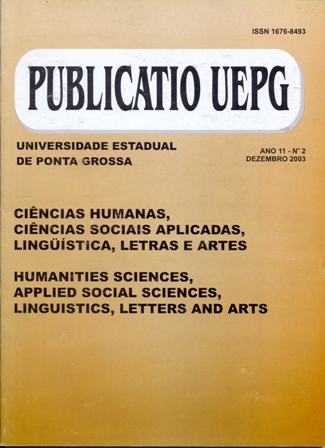TRANSCULTURATION IN THE VENTRILOQUIST’S TALE
DOI:
https://doi.org/10.5212/publ.humanas.v11i2.495Resumo
Transculturation is a key word in post-colonial encounters and involves the phenomena of colonial space, contact zone, cultural sites, transformation, adaptation and hybridity. In the context of the imbalances that the cross-cultural space reveals, the reaction of the colonial subject through parody, mimicry and sly civility in the novel The Ventriloquist’s Tale (1999) by Guyanese novelist Pauline Melville is discussed. European cultural hegemony represented by the adventurer, the religious and the intellectual is interrelated with a family group of savannahs Amerindians, with their mythology, culture and customs. The cross-cultural encounter shows the weakness of Western culture when the latter endeavors to other a ‘primitive’ community and treats its mores as subaltern and defective. The parodical attitudes of the Macusi Amerindians keep at bay the encroachments of disrupting Western culture, while their sly civility maintains their identity. However, this does not downplay colonial violence and the stratification policy it enforces. If the resulting hybridity ideologically reshaped colonized Amerindians, it also reveals the defeat the three European categories mentioned above suffered in the wake of their cultural encounter.
Key words: colonial encounters; hybridity; transculturation
Downloads
Edição
Seção
Licença
a) Os autores mantém os direitos autorais e concedem à revista o direito de primeira publicação, com o trabalho simultaneamente licenciado sob a Creative Commons Attribution License que permite o compartilhamento do trabalho com reconhecimento da sua autoria e publicação inicial nesta revista.
b) Esta revista proporciona acesso público a todo o seu conteúdo, uma vez que isso permite uma maior visibilidade e alcance dos artigos e resenhas publicados. Para maiores informações sobre esta abordagem, visite Public Knowledge Project, projeto que desenvolveu este sistema para melhorar a qualidade acadêmica e pública da pesquisa, distribuindo o OJS assim como outros softwares de apoio ao sistema de publicação de acesso público a fontes acadêmicas. Os nomes e endereços de e-mail neste site serão usados exclusivamente para os propósitos da revista, não estando disponíveis para outros fins.
This journal provides open any other party.
Esta obra está licenciada sob uma Licença Creative Commons



